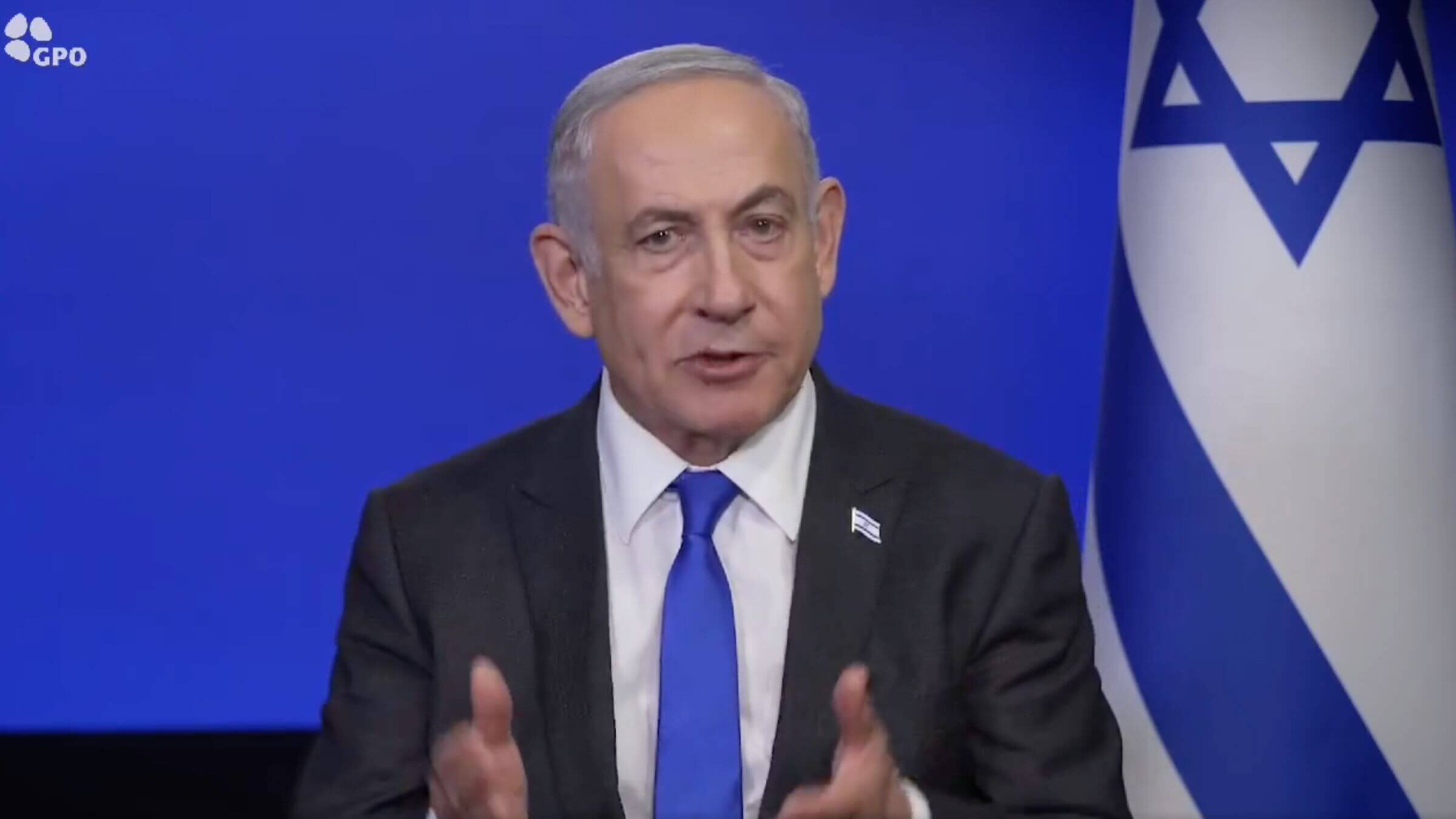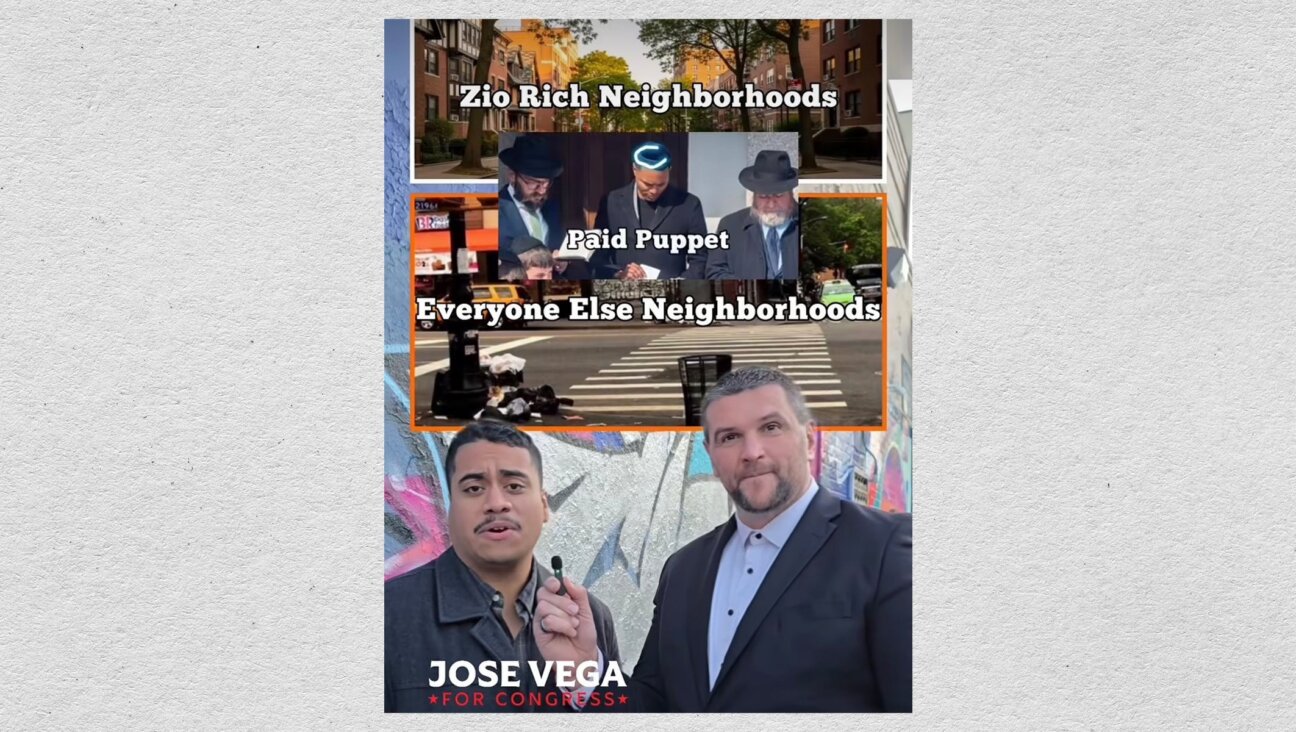Netanyahu decries ‘antisemitic mobs’ at Columbia as university negotiates with student protesters
The protesters say they won’t leave the university’s central lawn until it divests from companies that work with Israel’s military

Israeli Prime Minister Benjamin Netanyahu condemned protesters in a video published on X. Courtesy of Screenshot via Ofir Gendelman on X
Israeli Prime Minister Benjamin Netanyahu, responding to the chaos at Columbia, said in a video statement released Wednesday that “antisemitic mobs have taken over leading universities.”
He added: “They call for the annihilation of Israel, they attack Jewish students, they attack Jewish faculty. This is reminiscent of what happened in German universities in the 1930s. It’s unconscionable. It has to be stopped. It has to be condemned unequivocally. But that’s not what happened.”
PM Netanyahu's statement with regard to the latest events in American university campuses. pic.twitter.com/r0XIW03Wtp
— Ofir Gendelman (@ofirgendelman) April 24, 2024
Also Wednesday, House Speaker Mike Johnson told conservative talk show host Hugh Hewitt that Columbia President Minouche Shafik should resign. He charged that she “cannot even guarantee the safety of Jewish students” who are “expected to run for their lives and stay home from class.” He met with Jewish students on campus later in the day.
Protesting Columbia students did not meet a midnight deadline to dismantle their “Gaza Solidarity Encampment” but negotiations continue with the university, which has threatened to call police to again campus to enforce its rules.
This past week’s tumult, with proliferating encampments and arrests at several campuses, marks a turning point in the protest movement against Israel that began shortly after Oct. 7. It has sparked outrage around the country and globally against the protesters, but also against the university for calling in the New York Police Department Thursday. More than 100 students were arrested. Shafik last week also cancelled in-person classes to “deescalate the rancor.”
Negotiations and outcry
An email from Shafik’s office to the university community Tuesday night said that protesters had agreed to remove a significant number of the dozens of tents dotting Columbia’s central lawn; assure that only Columbia students participated in the protest; comply with the requirements of the New York Fire Department, which inspected the encampment; and refrain from discriminatory and harassing language.
The university said it has extended its deadline for 48 hours.
PEN America on Wednesday issued a statement decrying Shafik’s handling of the protesters, writing that student protests should be “zealously protected.” Campus leaders, PEN said, “have been quick to take punitive action and crack down on peaceful protest. Columbia University’s quick move to call in the NYPD last week to shut down protests that had remained peaceful was disturbing; rather than bringing the temperature down, it has escalated the situation on campus and caused ripple effects around the country.”
PEN also noted that the crackdown on protesters “came in the context of mounting political pressure on Columbia’s leadership, including in a congressional hearing the previous day, raises further concerns about the degree to which the administration is making decisions that prioritize students’ rights to free expression on campus.”
The controversy over anti-Israel protests felled two Ivy League presidents in recent months. Claudine Gay of Harvard and Liz Magill of the University of Pennsylvania resigned after their testimony before the same congressional committee that grilled Shafik last week about her responses to antisemitism on campus. Calls for Shafik’s resignation in the past week have come from both those who support the protesters and those who criticize them as antisemitic. Several Jewish elected officials released a letter on Thursday pushing back on those calls.
“Nothing whatsoever is gained for the safety of Columbia’s Jewish and other students, or fighting ugly antisemitism, or for preserving universities’ role as critical institutions of liberal democracy by cynical calls for President Shafik’s resignation,” wrote six officials, including U.S. Rep. Jerry Nadler, a Democrat who represents the Upper West Side, where Columbia is located and Brad Lander, the city’s comptroller. “It is unfortunate that some are exploiting Jewish lives to score cheap political hits and further Republican goals of attacking liberal institutions.”
Columbia Students for Justice in Palestine tweeted shortly after midnight that their protest goes on.
“We refuse to concede to cowardly threats and blatant intimidation by university administration. We will continue to peacefully protest.”
PRESS RELEASE:
— Columbia Students for Justice in Palestine (@ColumbiaSJP) April 24, 2024
Columbia University Threatens Students with the National Guard After Refusing to Bargain in Good Faith.
We refuse to concede to cowardly threats and blatant intimidation by university administration. We will continue to peacefully protest. #cu4palestine pic.twitter.com/IqAlXwyeHN
About 5,00o Jewish students attend Columbia. Some participate in the protest, but many have said protesters use antisemitic and threatening language against Jews and Israelis.
Reverberations
The escalation in protests began just before dawn on Wednedsay, when students pitched tents in the hours before Shafik testified before a congressional committee on antisemitism on campus. Protests have roiled the campus since Oct. 7, when Hamas attacked Israel, killing around 1,200 and kidnapping 240, dozens of whom still remain in captivity. Israel responded with a military campaign that has killed more than 34,000 in Gaza, according to the Hamas-run Gaza health ministry.
In past months protesters focused on ending the war. In recent weeks they have stepped up calls for Columbia to divest from companies that do business with Israel’s military.
Protesters say they will remain in the encampment until Columbia divests. It was cleared last week, but then a larger one soon appeared in its place. Students erected similar encampments in the following days at other universities, including Yale, New York University, Tufts and Pomona.
The controversy over anti-Israel protests felled two Ivy League presidents in recent months. Claudine Gay of Harvard and Liz Magill of the University of Pennsylvania resigned after their testimony before the same congressional committee that grilled Shafik last week about her responses to antisemitism on campus. Now there are calls for Shafik’s resignation from both those who support the protesters and those who criticize them as antisemitic. Several Jewish elected officials released a letter on Thursday pushing back on those calls.
“Nothing whatsoever is gained for the safety of Columbia’s Jewish and other students, or fighting ugly antisemitism, or for preserving universities’ role as critical institutions of liberal democracy by cynical calls for President Shafik’s resignation,” wrote six officials, including U.S. Rep. Jerry Nadler, a Democrat who represents the Upper West Side, where Columbia is located, and Brad Lander, the city’s comptroller. “It is unfortunate that some are exploiting Jewish lives to score cheap political hits and further Republican goals of attacking liberal institutions.”















